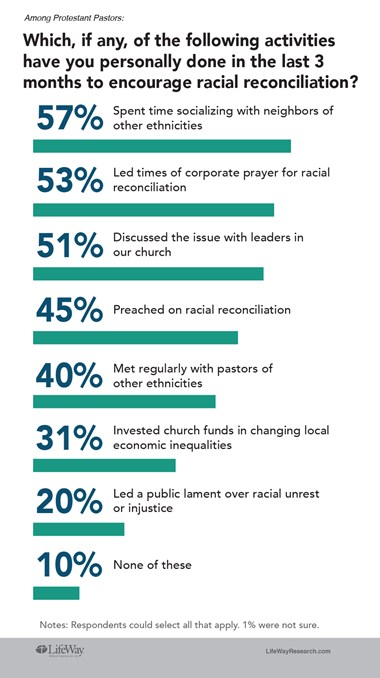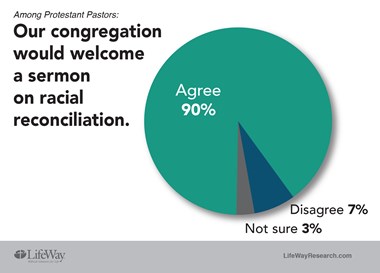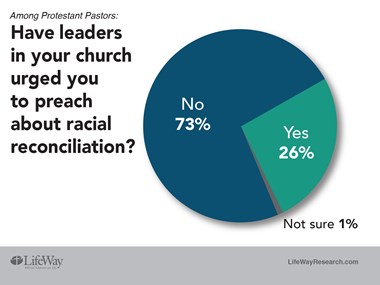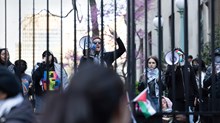
Nine out of 10 American pastors say they recently encouraged racial reconciliation. Their favorite method: Breaking bread with someone of another ethnicity.
A new survey of 1,000 Protestant senior pastors by LifeWay Research examines how they address race beyond the pulpit, as well as whether their congregations demand such sermons.

Almost three-quarters (72%) of pastors have shared a meal with a diverse small group of people (less than 10) in the past month. That includes 44 percent who say they’ve had such a meal in the past week.
The proportion is similar among white pastors, 42 percent of whom say they’ve had a meal in the past week with a diverse group. Such meals are more common among African-American pastors (52%) and pastors of other ethnicities (60%).
The proportion varies by denomination. Pentecostal (50%), Methodist (48%), and Baptist (46%) pastors were more likely to have shared a meal with a diverse group in the past week, while Presbyterian/Reformed pastors (34%) were less likely.
“Most pastors appear to be taking a leadership role in encouraging racial reconciliation,” said Scott McConnell, executive director of the Nashville-based research organization. “Nine in 10 pastors say they recently have done something to encourage racial reconciliation.
“A majority have been socializing with other races and ethnicities and have led prayer on racial reconciliation,” he noted. “But less than a third have addressed economic inequity or publicly lamented injustice.” [See chart]
Nine in 10 Protestant congregations would welcome a sermon on racial reconciliation, according to their senior pastors (57% strongly agree, 33% somewhat agree). Seven percent disagree, while three percent aren’t sure.

Almost half (45%) of pastors say they have preached on racial reconciliation in the last three months. This includes 40 percent of evangelical pastors and 53 percent of mainline pastors.
Few have been criticized for it. In the last two years, about 90 percent of pastors spoke about the topic, and 84 percent received no negative feedback while 5 percent did.
But few congregational leaders seem to want more sermons on race, according to their pastors. About three-quarters of pastors (73%) say they have not been urged by church leaders to preach about reconciliation, while about a quarter (26%) have been urged.
Presbyterian/Reformed pastors are likely to have churches open to sermons on reconciliation (92%) as well as likely to have been urged to preach on the topic (37%).

Baptist (92%) and Pentecostal (93%) pastors are likely to say their church would welcome a sermon on reconciliation, but are less likely to have been specifically asked by church leaders to preach on the topic. Only about 1 in 5 Baptist (17%) or Pentecostal pastors (20%) have been urged to address reconciliation.
Overall, mainline pastors are more likely to have been urged to preach on racial reconciliation than evangelical pastors (38% vs. 22%).
Pastors over 65 are least likely to have preached on racial reconciliation in the last quarter (32%), and least likely to have been urged to preach on it (18%).
A 2015 survey of American churchgoers found that two-thirds (67%) said their church had done enough to become diverse. More than half (53%) disagreed with the statement, “My church needs to become more ethnically diverse,” while 40 percent agreed and 7 percent weren’t sure.
Evangelicals (71%) were most likely to say their church is diverse enough, and white churchgoers (37%) are least likely to say their church should become more diverse.
While most pastors said their congregation is predominantly one racial or ethnic group (86%), a 2014 study found that most pastors believe every church should strive for racial diversity (85%) and that “churches should reflect the racial diversity in their community” (91%).
“It seems like most congregations are eager for somebody else to do the work of reconciliation,” McConnell said, “rather than embrace it for themselves.”
Methodology:
The phone survey of Protestant pastors was conducted Aug. 22–Sept. 16, 2016. The calling list was a stratified random sample, drawn from a list of all Protestant churches. Quotas were used for church size. Each interview was conducted with the senior pastor, minister or priest of the church called. Responses were weighted by region to more accurately reflect the population. The completed sample is 1,000 surveys. The sample provides 95 percent confidence that the sampling error does not exceed plus or minus 3.2 percent. Margins of error are higher in sub-groups.
LifeWay Research is a Nashville-based, evangelical research firm that specializes in surveys about faith in culture and matters that affect churches.

Support Our Work
Subscribe to CT for less than $4.25/month




















